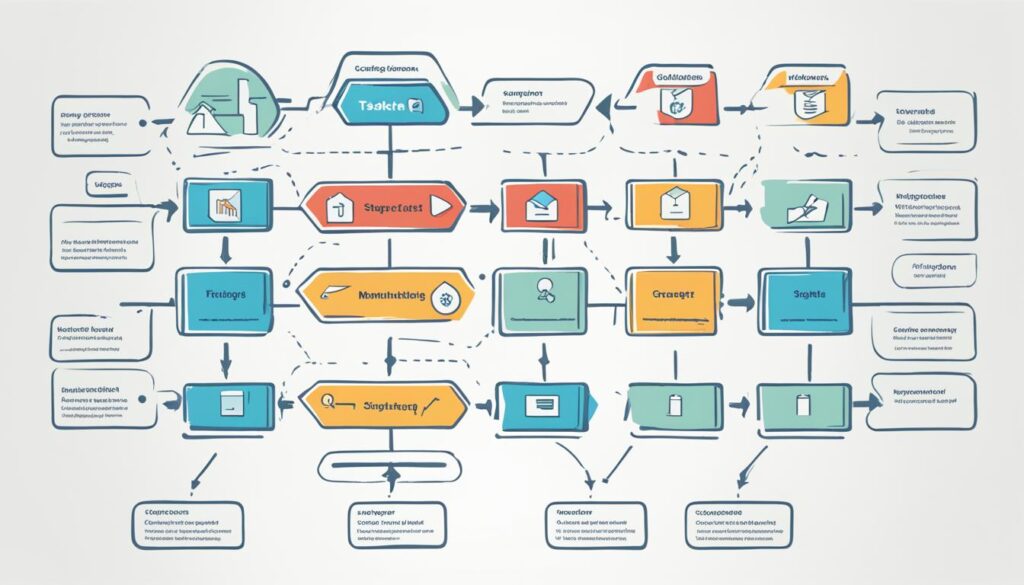The task management process is essential for successful project delivery. In South Africa, where projects span across various industries, understanding and implementing the task management life cycle is crucial to achieve organizational goals. This life cycle breaks down the complex journey of a task into manageable task management steps, ensuring that every stage from inception to completion is navigated with precision and clarity.
Key Takeaways
- Insight into a structured task management life cycle enhances project success.
- Each of the task management steps is integral to the overall workflow.
- Task management process mastery leads to more efficient goal achievement.
- Understanding these stages ensures better resource and time allocation.
- Knowledge of the life cycle is vital for professionals in all sectors in South Africa.
Introduction to Task Management in a Project Environment
Navigating through the complexities of a project requires a systematic approach, and that’s where effective task management methodology steps in. Task management in a project environment is foundational to achieving project goals, ensuring that each activity—and corresponding tasks—is orchestrated to collectively drive a project to completion.
Understanding Task Management and Its Importance
Adopting robust task management phases across the project life cycle can dramatically enhance the quality and efficiency of project outcomes. These phases provide a structured framework that helps project managers and their teams to remain focused, avoid common pitfalls, and adjust to unforeseen challenges, all while ensuring resources are optimized, and milestones are met on time.
Comparing Task Management and Project Management
Task management is often viewed through the lens of micro-management, where the focus is on individual tasks that contribute to the larger project. Contrastingly, project management encompasses a wider scope, involving strategic planning and execution that ties all the individual tasks together under a united project vision. This includes establishing project objectives, resource allocation, risk mitigation, and achieving deliverable quality standards.
Key Principles Underpinning Effective Task Management
There are fundamental principles that govern the success of task management within any project. These include:
- Objective clarity: Defining what each task aims to achieve.
- Methodology flexibility: Using proven methods like SMART goals or CLEAR tasks to adapt to project needs.
- Diligent tracking: Monitoring progress through Key Performance Indicators (KPIs).
- Review and reflection: Conducting post-task evaluations for continuous improvement.
By adhering to these principles, the task management methodology becomes a reliable ally in navigating the project environment, driving tasks from inception to successful completion.
| Task Management Phase | Key Focus | Tools & Methodologies |
|---|---|---|
| Initiation | Objective setting and task outline | Brainstorming, SMART goals |
| Planning | Resource allocation, risk assessment | Gantt charts, CLEAR tasks |
| Execution | Task implementation, team management | Project management software, delegation tools |
| Monitoring | Performance tracking, quality control | KPI dashboards, regular reporting |
| Closure | Task finalization, outcome evaluation | Post-implementation review, feedback sessions |
What Are the 5 Stages of Task Management?
The journey through the task management life cycle involves a structured approach, ensuring projects progress from conception to completion with efficiency and clarity. Within this framework, the task management steps unfold across five distinct stages. These stages include initiation, planning, execution, monitoring, and closure. In each stage, the main management tasks encompass identifying project goals, assigning responsibilities, tracking progress, addressing any issues, and ultimately delivering the final product. By following this systematic process, organizations can effectively manage their tasks and achieve successful project outcomes.
Initiation: Laying the Groundwork for Success
The initiation stage marks the beginning of the task management life cycle, where the foundational elements of a project are established. This involves defining the project’s objectives, determining its feasibility, and securing the necessary approvals and budget allocations to move forward.
Planning: Roadmap Creation for Task Accomplishment
Following initiation, meticulous planning is essential. This stage is where the project’s goals are elaborated, the project scope is developed, and detailed project plans and communication strategies are laid out, often using time-tested methodologies like SMART or CLEAR.
Execution: Bringing the Task Management Plan to Life
With a robust plan in place, the execution stage breathes life into the project. Teams are mobilized, resources are managed, and deliverables are created, all while maintaining a keen eye on quality and the project’s overarching goals.
Monitoring & Control: Ensuring Task Alignment with Goals
In tandem with execution, monitoring and control are pivotal in the task management life cycle. This is the oversight phase where project progression is measured against KPIs, with continuous adjustments and interventions to keep the trajectory aligned with the plan.
Closure: Finalizing and Assessing Task Outcomes
As the project reaches its end, the closure stage involves the completion, handover, and disbanding of the project team. It’s also a critical time for evaluating the project, drawing valuable lessons for future task management endeavors.
| Stage | Core Activities | Expected Outputs |
|---|---|---|
| Initiation | Defining objectives, securing budget, and approvals. | Project Mandate, Project Initiation Document (PID) |
| Planning | Setting goals, developing project scope, creating detailed plans. | SMART/CLEAR goals, Project Scope, Communication Strategy |
| Execution | Enacting project plans, managing resources and team coordination. | Quality deliverables, Resource Allocation, Team Management Reports |
| Monitoring & Control | Tracking progress, performance measurement, and corrective actions. | Performance Reports, Updated KPIs, Adjustment Plans |
| Closure | Completing and handing over the project, conducting reviews. | Final Report, Lessons Learned Document, Closure Presentation |
Delving Deeper into Task Management Methodology
The core of any task management methodology lies in its ability to streamline and organize how we handle various tasks within complex projects. This methodology has evolved into an art and science that employs the most effective task management processes to take a task from infancy to its final stages of completion.

While task management can often seem daunting, it’s a critical component for the success of any project. A methodological approach divides tasks into smaller, more manageable components, thereby simplifying the overall process and making tasks seem less overwhelming.
Adopting a standardized task management methodology helps in mitigating risks, reducing costs, and improving outcomes. Real-world standards such as the PMBOK® Guide, published by the Project Management Institute, provide frameworks that are fundamental to these methodologies.
- Clear Objectives: Setting definitive goals and milestones.
- Customizable Framework: Tailoring the process to fit the project’s unique requirements.
- Resource Allocation: Efficient distribution of resources and time.
- Quality Control: Ensuring the task outcomes meet predetermined standards.
- Continuous Improvement: Adopting a cycle of evaluation and refinement of task management practices.
Let’s consider the tangible benefits of applying a rigorous task management methodology to your projects:
| Methodology Benefit | Example | Impact |
|---|---|---|
| Structured Planning | Creating a roadmap for each task | Enhanced foresight and planning capabilities |
| Consistent Processes | Standard operating procedures | Increased efficiency and reduced chances for error |
| Adaptive Execution | Agility in task delegation and management | Flexibility to changing project dynamics |
| Monitoring Progress | Tracking through KPIs and metrics | Real-time assessment and adjustments |
| Risk Reduction | Proactive issue identification | Avoidance of potential future setbacks |
| Completion and Review | Post-task analysis for continuous improvement | Valuable insights gained for future tasks |
Incorporating these task management processes not only fosters an environment where tasks are completed efficiently but also ensures that each completed task propels the project toward its final goal. Hence, task management is not just about doing tasks right; it’s about doing the right tasks at the right time, every time.
Best Practices for Managing Tasks Through Each Stage
Task management best practices form the backbone of a successful project, ensuring a systematic approach to achieving milestones and delivering results. From the initial conception of a task to its grand finale, these best practices facilitate effective task management at every level, thereby boosting productivity and ensuring a smooth project trajectory.
Clear goal-setting is crucial at the initiation stage, along with developing comprehensive documentation, such as project charters and stakeholder registers. At the planning stage, task management best practices dictate the creation of detailed task lists, schedules, and resource allocation strategies. This approach is essential for navigating the project’s scope efficiently, setting the stage for effective execution.
During the execution phase, harnessing the power of project management software is a symbol of effective task management. This technology provides tools to assign tasks, manage deliverables, and guarantee quality assurance, supported by documents like work orders. Meanwhile, the monitoring and control phase revolves around maintaining meticulous records, successfully managing any changes, and ensuring stakeholder communication is continual and transparent.

As we approach closure, task management best practices emphasize the need for organizing and archiving project materials, alongside final reporting and thorough evaluations. These final steps pave the way for identifying areas of improvement, capitalizing on the experiences gathered throughout the project lifecycle.
To encapsulate the essence of effective task management, let’s visualize these best practices through the following tabular representation:
| Stage | Best Practices | Tools & Documents |
|---|---|---|
| Initiation | Clear goal-setting, stakeholder identification | Project charter, stakeholder registers |
| Planning | Developing task lists, setting schedules, allocating resources | Project plan, resource allocation chart, Gantt charts |
| Execution | Assigning tasks using project management software, quality assurance | Project management platforms, work orders |
| Monitoring & Control | Recording progress, managing changes, stakeholder reporting | Progress reports, change requests |
| Closure | Organizing project materials, final reporting, post-project evaluation | Project archives, evaluation reports |
Embracing these practices at each stage ensures not only the completion of tasks but their strategic alignment with the broader goals of the project, turning task management into a potent tool for achieving organizational success.
Initiation: Setting the Stage for Task Management
Every project’s journey begins with the critical task management phase of initiation. This initial stage is where the foundation of the entire task management process is established, therefore having an overarching influence on the successive task management phases. Here, we delve into the formulation of a robust business case and the crucial steps in generating a Project Initiation Document (PID) that act as the guiding beacons for the entire task management life cycle.
Developing the Business Case and Feasibility Studies
In task management initiation, a thorough consideration of the project’s viability is paramount. The business case offers a convincing argument for undertaking the project, encompassing a balance sheet of the potential benefits relative to the anticipated costs. A feasibility study complements this by assessing if the project is practical and how it can offer solutions to the identified problems.
Creating a Project Initiation Document (PID)
The Project Initiation Document is arguably the cornerstone of task management initiation. It embodies not just the business case, but also serves as a comprehensive dossier detailing several vital aspects that guide the project throughout subsequent task management phases. These include defined goals, scope, organizational structure, resource allocation, risk identification, and the stakeholder environment.
| Document Element | Description | Purpose in Task Management |
|---|---|---|
| Business Case | Justification of project investment | Clarifies project benefits against costs |
| Goals and Scope | Project objectives and boundaries | Defines what the project aims to achieve and the limits |
| Structure and Stakeholders | Organizational chart and stakeholder identification | Outlines project accountability and interested parties |
| Risks and Constraints | Potential issues and project limitations | Forecasts impediments to plan mitigation strategies |
| Project Controls | Management processes and reporting systems | Ensures ongoing alignment with project goals and quality |
| Closure Criteria | Benchmarks for project completion assessment | Measures to evaluate success post-project realization |
The initiation phase is not only the beginning but the blueprint for all subsequent task management phases, guiding teams through the complexities of the project with clarity and strategic foresight. Its outcomes set the trajectory for the project’s lifecycle, ensuring a sturdy foundation for the path ahead.
Planning: Mapping Out Task Success
The bedrock of any successful task management lies in thorough task management planning. This fundamental stage serves as a pivotal point where project goals transition from abstract to concrete. Methodologies such as SMART (Specific, Measurable, Achievable, Relevant, and Time-Bound) or CLEAR (Collaborative, Limited, Emotional, Appreciable, and Refinable) are employed to set realistic and attainable goals. But setting goals is just the start. A comprehensive project plan emerges as the blueprint for success, detailing every nuance from the divisions of labor to the allocation of resources.
Integral to the construction of this foundation is the development of a work breakdown schedule, an essential component of project plan development. This detailed documentation not only delineates each task along with its designated owner but also encompasses the associated timelines, milestones, and financial outlines. Such clarity in roles, responsibilities, and expectations is paramount for maintaining project alignment and navigating the path to its successful completion. Additionally, the planning stage doesn’t overlook the potential for unforeseen challenges; risk management plans are crafted to mitigate possible threats, and communication plans are devised to ensure transparency and continuous engagement across all project stakeholders.
To encapsulate, meticulous planning is the cornerstone of task management, bridging the gap between conceptualization and actualization. By crafting detailed project plans and schedules, a structured framework is provided within which teams can thrive and project objectives can flourish. As projects evolve amidst a dynamic environment, these foundational documents serve as navigational tools, steering the project through complexities towards its intended outcomes—and ultimately, towards its contribution to business success in South Africa and beyond.







